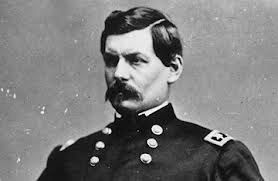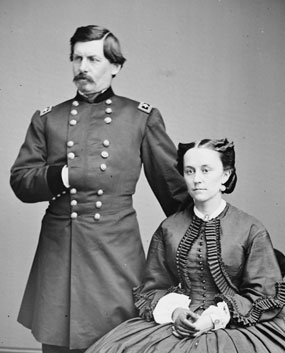 General George B. McClellan was all bark and no bite, and some of his contemporaries complained of McClellan, that dog don’t hunt. McClellan sometimes was the correct military leader at the right place at the right time. “Little Mac” possessed superior intelligence, charm, tenacity and a grating ego that surpassed all his best assets. He was the common troopers favorite, amassing defenses and organizing troop strength at the beginning of the Civil War, that was a daunting task. Training tens of thousands of volunteers in a static defensive position and preparing them for combat, that was many months in the future, if ever. No one, in or out of government, knew when McClellan would attack the Confederates, because he continuously needed more troops, horses, bridging, or supplies. If the truth were known, “Little Mac” probably had no idea himself, when, or if, he could or would pull the trigger. Everything he had ever done, was the work or the idea of someone else, from his military manuals, the “McClellan Saddle”, to European logistics and strategy. Bottom line, McClellan was the perfect fit for, that dog don’t hunt.
General George B. McClellan was all bark and no bite, and some of his contemporaries complained of McClellan, that dog don’t hunt. McClellan sometimes was the correct military leader at the right place at the right time. “Little Mac” possessed superior intelligence, charm, tenacity and a grating ego that surpassed all his best assets. He was the common troopers favorite, amassing defenses and organizing troop strength at the beginning of the Civil War, that was a daunting task. Training tens of thousands of volunteers in a static defensive position and preparing them for combat, that was many months in the future, if ever. No one, in or out of government, knew when McClellan would attack the Confederates, because he continuously needed more troops, horses, bridging, or supplies. If the truth were known, “Little Mac” probably had no idea himself, when, or if, he could or would pull the trigger. Everything he had ever done, was the work or the idea of someone else, from his military manuals, the “McClellan Saddle”, to European logistics and strategy. Bottom line, McClellan was the perfect fit for, that dog don’t hunt.
George B. McClellan was born into a wealthy Philadelphia family in 1826 and was accepted into the United States Military Academy, at 15, after his father had written a personal request to then President John Tyler. He was an outstanding student and graduated among the top of his class. After graduation, his next posting was with a personal friend of his father, General Winfield Scott. Under Scott’s wing McClellan distinguished himself during the Mexican War, as an engineering officer and saw extensive combat. After the conflict, “Little Mac” surveyed future railroad routes through the Northwest, reported on railroad logistics and performed other clandestine assignments for Secretary of War, Jefferson Davis, who had taken a special interest in the young officer.
McClellan, resigned his commission in 1857, using his ever-increasing political and family connections, lobbied and received an executive position with the Illinois Central Railroad, whose legal representation was the firm of Lincoln and Herndon. Always seeking ways to increase his public visibility, McClellan became active in politics and was an early supporter of Democrat Stephen A. Douglas. He married Mary Ellen Marcy, the daughter of one of his previous commanders, in 1860. McClellan called his new bride, Nellie, who eventually became his greatest admirer, promoter and confidante.
The Civil War was a tailor-made opportunity for the young McClellan. His military and railroad resume resulted in Ohio recruiting his talents as a General of Volunteers and his political and business connections led to a rapid succession of promotions, ending with McClellan being second only in command to General in Chief Winfield Scott. After several minor victories in West Virginia, Lincoln recruited McClellan as commander of the defenses of Washington. General McClellan created the Army of the Potomac, with himself as overall commander. The aging Scott and the self-centered and egotistical McClellan clashed over strategy. So the “Boy General”, the savior of the Union, petitioned President Lincoln with a grandiose plan to crush the rebellion. Under tremendous public and political pressure and the humiliating defeat at First Bull Run, General Scott resigned and Lincoln promoted McClellan to General in Chief, in November of 1861.
 General in Chief McClellan wrote letters to his wife Nellie almost daily, keeping her up to date on his latest accomplishments and accolades, his unlimited authority and the not to remote possibilities of a military dictatorship, if he deemed to accept it. To his credit, “Little Mac’s”organizational and training disciplines, transformed the thousands of raw recruits, surrounding Washington, into a proud and well oiled machine, lacking only one key ingredient, combat experience.
General in Chief McClellan wrote letters to his wife Nellie almost daily, keeping her up to date on his latest accomplishments and accolades, his unlimited authority and the not to remote possibilities of a military dictatorship, if he deemed to accept it. To his credit, “Little Mac’s”organizational and training disciplines, transformed the thousands of raw recruits, surrounding Washington, into a proud and well oiled machine, lacking only one key ingredient, combat experience.
President Lincoln and Secretary of War Stanton, realized that they had created a tremendous liability with McClellan, he was tremendously popular with the public and the press, his Napoleonic demeanor went unchallenged and not even direct orders from the President could make the “Boy General” commit to an attack on the Confederate forces. It appeared that the only recourse was to hope that General McClellan would attack and fail. Groups of Radical Republicans in business and government came to Lincoln’s rescue and demanded that McClellan attack or be relieved. “Little Mac” was beside himself and related to his wife that the President and his cabinet were out to ensure his ultimate failure, he was under staffed and troop levels needed to be increased, anything and everything were possible excuses for McClellan not to follow orders, his fear of failure was paralyzing his every movement.
Eventually, General McClellan did attack and despite his best planning, superior training, transportation, supply and overwhelming troop strength, all resulted in humiliation and defeat. President Lincoln relieved him of the rank of General in Chief and his only command was that of Army of the Potomac. This set the stage for the bloodbath that would become the death knell for the “Boy General’s” military career, Antietam.
President Lincoln removed McClellan from command and as usual “Little Mac” sought solace from his wife, writing.
“Those in whose judgment I rely tell me that I fought the battle splendidly and that it was a masterpiece of art… I feel I have done all that can be asked in twice saving the country… I feel some little pride in having, with a beaten & demoralized army, defeated Lee so utterly. .. Well, one of these days history will I trust do me justice.”
When President Ulysses S. Grant was touring Europe after his term in office, a newspaper man asked his opinion of General George B. McClellan. Grant in his most humble and politically unassuming demeanor replied,
“McClellan to me is one of the mysteries of the war….”
To many George B. McClellan will always be remembered as, that dog don’t hunt.
Bummer


The thing that amazes me most was McClellan’s term as governor of New Jersey after the war. He lost so badly to Lincoln it’s hard to imagine he still had any kind of political future. I wonder if he still thought he could be president and would use that job as a stepping stone.
Louis,
Bummer believes that McClellan served only one term as governor of N.J. and his last major role was in support of Cleveland. He always had a need for immortality, but he had basically spent all his political capital. Grant’s two terms sealed McClellan’s political fate and other than a couple of monuments, he’s lost in the well of failed Union General’s. His memory alone is enough to spoil any day for this “old guy.” Where’s Storm’in Norman when we need him.
Bummer